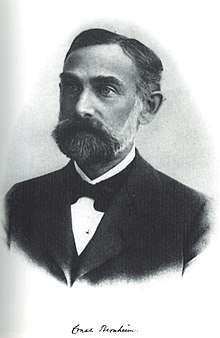Ernst Bernheim
Ernst Bernheim (19 February 1850 – 9 July 1942) was a German historian, best known for an influential Lehrbuch der historischen Methode (1889) on historical method.

Family
He was born in Hamburg as a son of merchant Louis Bernheim (later changed to Ludwig Berheim, born 7 December 1815 in Fürstenberg) and Emma Simon (born 15 April 1834 in Kolberg), who since 1834 lived in Hamburg. On 16 April 1884 he married Amalie ("Emma") Henriette Jessen (born 18 September 1861 in Hamburg, died 9 July 1945 in Greifswald). They had a daughter and three sons.[1]
Career
Ernst attended the Johanneum since Easter, 1862, and graduated with Abitur on 22 September 1868. From 1868 to 1872 he studied history in Berlin, Heidelberg, and Straßburg. He graduated with the grades Dr. phil and Dr jur. in Straßburg (1873, supervised by Georg Waitz), and Dr habil in Göttingen (1874/75, supervised by Julius Weizsäcker). Thereafter, he taught history at the University of Göttingen and at the University of Bonn. In 1883, he was called to the University of Greifswald, Institute for History, where he held the positions of an "außerordentlicher Professor" ("Privatdozent") since 1883, and "ordentlicher Professor" since 1889. In 1899, he was elected rector of the university. His eremitation was in 1921.
Nazi era
Due to his Jewish descent, Bernheim was subject to repressions during the Nazi era. In 1933 he was forbidden to lecture, and an appeal to Hitler to regain this permission was not successful. On 4 December 1935, with the implementation of the Nuremberg Laws, Berheim lost German citizenship. An appeal to Hitler to regain citizenship, which was backed by a number of scientists from the University of Greifswald was successful - Bernheim was assigned "temporary citizenship" on 12 January 1938, thus avoiding deportation in 1940. Yet, just weeks before his death, the deaf-mute fosterchild of the family, Hetti Meyer, was deported to Theresienstadt and killed. Hetti was raised from her birth by Bernheim and his wife Emma, a special education teacher. From 1939 onwards, Nazi scientists systematically besmirched Bernheim's scientific work, which was only appreciated again in post-war Germany. Bernheim died on 3 March 1942 in Greifswald. His former colleagues managed to circumvent Nazi orders and get his urn buried in the town's graveyard on July 23, 1943, but an obituary was not permitted.
Memory
A memorial plaque was attached to his Greifswald house in 26 Arndtstraße road. Furthermore, a street in Greifswald was named after him.
References
- Staatsarchiv Hamburg, 741-2, Genealogische Sammlung, Bernheim
- Irene Blechle, Entdecker der Hochschulpädagogik. Die Universitätsreformer Ernst Bernheim und Hans Schmidkunz. Shaker Verlag, Aachen 2002, ISBN 3-8265-9943-8, pp. 29ff (youth); pp. 332ff (Nazi era)
External links
- Works by or about Ernst Bernheim in libraries (WorldCat catalog)